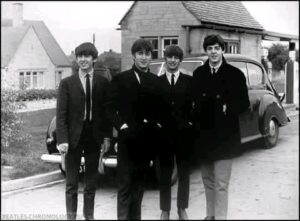
Led Zeppelin, visions of Robert Plant’s soaring vocals, Jimmy Page’s legendary guitar riffs, and John Bonham’s thunderous drums often come to mind. But lurking just beneath the surface—an unsung hero, a musical chameleon—was John Paul Jones. The secret weapon. The band’s Swiss army knife. Today, we delve into the life and legacy of the man who held Zeppelin together with his genius—John Paul Jones.”
—
Scene transitions to a cozy, dimly lit studio filled with vintage instruments and sheet music.
Narrator (V.O.):
“Born John Richard Baldwin in 1946, in Sidcup, Kent, Jones’s journey into the heart of rock ’n’ roll was anything but ordinary. From an early age, he displayed an extraordinary talent for music—playing piano, cello, and later, bass guitar. His versatility would become his defining trait.”
Cut to images of Jones as a young musician, recording in studios, working with other artists.
V.O.:
“Before joining Led Zeppelin, Jones was already a respected session musician, known for his impeccable skill and adaptability. He lent his talents to legendary artists like The Rolling Stones, Dusty Springfield, and Donovan. His experience as an arranger and multi-instrumentalist gave him a broad musical vocabulary—an invaluable asset that would shape Zeppelin’s sound.”
Scene shifts to footage of Led Zeppelin rehearsing, with close-ups of Jones at his keyboard and bass.
V.O.:
“While Plant, Page, and Bonham stole the spotlight with their fiery performances, Jones was the band’s secret weapon—quiet, versatile, and essential. On stage and in the studio, he was the glue that held everything together.”
Showcase clips of “Dazed and Confused,” “No Quarter,” and other Zeppelin classics.
V.O.:
“Take the hypnotic groove of ‘Dazed and Confused’—it’s Jones’s bass that drives the song’s ominous pulse. Or listen to the elegant, haunting keyboard lines in ‘No Quarter’—a testament to his classical training and musical depth. His touch added layers of texture, elevating Zeppelin’s sound beyond raw power into something more expansive and timeless.”
Insert interview snippets with band members or music historians praising Jones’s contributions.
Historian (clip)
“John Paul Jones was the band’s musical backbone. His ability to seamlessly switch from bass to keyboards, to arrange complex parts, made Zeppelin’s sound richer and more dynamic.

V.O.:
“Despite his pivotal role, Jones preferred to stay out of the limelight. His humble nature and focus on the music made him an unsung hero—until now. But his influence extended beyond Led Zeppelin.”
Montage of Jones working on other projects, producing, and performing with various artists.
V.O.:
“After Zeppelin disbanded in 1980, Jones continued to innovate. He worked behind the scenes as a producer, arranger, and collaborator, always pushing boundaries and exploring new musical territories.”Return to footage of Zeppelin’s most iconic performances, emphasizing Jones’s presence.
V.O.:
“And yet, his fingerprints are everywhere in Zeppelin’s legendary catalog—from the layered textures of ‘Kashmir’ to the intricate arrangements of ‘The Rain Song.’”
Scene shifts to a modern-day interview with musicians inspired by Jones.
Musician (clip):
“John Paul Jones’s versatility taught me that a musician’s true power lies in adaptability. He could do it all—bass, keyboards, mandolin—and do it seamlessly. That’s rare.”
Ending scene: A slow montage of Jones’s career highlights, culminating in a quiet shot of him playing a keyboard.
V.O.:
“In the grand tapestry of rock history, John Paul Jones remains one of the most vital yet understated figures. His mastery, humility, and innovation continue to inspire generations. Because sometimes, it’s not the loudest voice that shapes the sound of legends—it’s the one behind the scenes, holding everything together.”
Fade out with the Led Zeppelin logo and a final shot of Jones’s silhouette against the sunset.
V.O.:
“John Paul Jones—more than a band member, a true musical genius.





